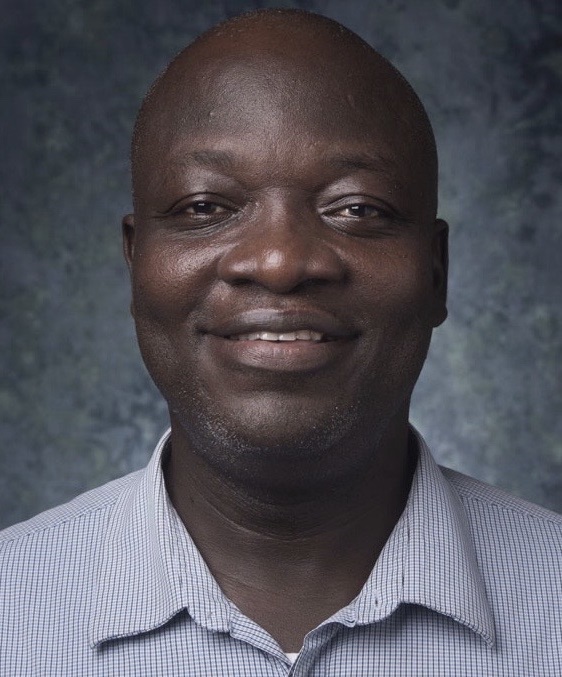 Position: Senior Research Scientist
Position: Senior Research Scientist
Team Leader: Wood Anatomy and Xylarium Center
Quality Manager: CSIR-FORIG Wood and Furniture Testing Center (ISO/IEC 17025 accredited lab.)
Email:
Tel: +233-50-854-1272 / +233-32-206-0123
Professional Interest
Development of tools and technologies to combat illegal timber trafficking; Wood forensics, anatomical identification of wood, Environmental effects on wood quality; Bamboo and rattan
Professional background
2012 PhD. (Forest Science). Michigan Technological University, Houghton, Michigan, USA.
1999-2003 M. Phil., (Wood Science) Institute of Renewable Natural Resources, Kwame Nkrumah University of Science and Technology, Kumasi, Ghana
1993-1997 B.Sc. (Natural Resources Management, Forestry option), University of Science and Technology, Kumasi, Ghana.
Projects
Current Projects
- Forensic wood science research, training, and subsequent purchase of equipment, sponsored by US-Forest Service, UNIDO, CSIR-FORIG, Ghana Forestry Commission <https://www.youtube.com/watch?v=kkaeaGVhX9U>
- Bamboo for the protection of Volta Lake, sponsored by VRA and Forestry Commission
Past Projects
- Rapid assessment of bamboo and rattan resources of Liberia (sponsored by International Bamboo and Rattan Organization, February – March 2017)
- Identification of male and female seedlings of Allanblackia parviflora a. Chev using anatomical and morphological characteristics, Contract number SD3/14/230, Sponsored by ICRAF, 2014 – 2015.
- Characterization of Allanblackia parviflora A. Chev. oil quantity and quality by tree and fruit morphological traits. Participating Scientist, 2014
- Sex Ratio of Allanblackia parviflora populations in Different Landuse Systems in Ghana. Co – authored with Mr. Jonathan Dabo. participating scientist, Sponsored by ICRAF, 2014 - 2016
- Kumasi Urban Forestry Project. Co-authored with Dr. A. Bredu, Dr. M. Apetorgbor, Dr. J. K. Asomaning & Mrs. Theresah Peprah (Sponsored by Kumasi Metropolitan Assembly (KMA),
- Plant Resources of Tropical Africa (ROTA) project. A multidisciplinary project designed to document available information on plant resources of tropical Africa www.prota4u.org, 2007-2009, Participating Scientist,
- Underwater logging project, Clark Sustainable Resources Development /CSIR-FORIG, Volta Lake, Ghana, 2007 to present Participating Scientist,
- Sustainable Development of Bamboo Resources of Ghana and Togo (Sponsored by AFORNET, Grant No. 4 of December, 2003:. Co-authored with Dr. A. A. Oteng-Amoako Dr. D. Ofori, Dr. L. C. N, Anglaare and Dr. B. Darko – Obiri, 2004-2009
- Tree and Wood Identification of 100 Lesser-Used and Lesser Known Timber Species from Tropical Africa with Notes on Ethnography, Silviculture and Uses (sponsored by ITTO), Participating scientist, 2000-2006
- African Rattan Research Programme (ARRP), R7636 Forestry Research Programme (sponsored by DFID), 2000-2004
Selected Publications
- Ebanyenle, E 2021. Personnel of Ghana’s Forestry Commission trained in wood identification. IAWA Newsletter, November 2021 http://www.iawa-website.org/uploads/allimg/pdf/newsletter/2021_Newsletter_November.pdf
- Arevalo, R., Ebanyenle, E., Ebeheakey, A. A., Bonsu, K. A., Lambog, O., Soares, R., Wiedenhoeft, A. C. 2020. Field identification manual for Ghanaian timbers. FPL Gen Tech. Rep. FPL-GTR-277. Madison, WI: U.S. Department of Agriculture, Forest Service, Forest Products Laboratory. 130 p <https://www.fpl.fs.fed.us/documnts/fplgtr/fpl_gtr277.pdf>
- Ravindran, P., Ebanyenle, E., Ebeheakey, A. A., Abban, K. B., Lambog, O., Soares, R., et al. (2019). “Image based identification of Ghanaian timbers using the XyloTron: Opportunities, risks and challenges,” in NeurIPS 2019 Workshop on Machine Learning for the Developing World. <https://arxiv.org/abs/1912.00296>
- Ebanyenle, E., Burton, A.J., Storer, A.J., Richter, D.L. and Glaeser, J.A., 2016. Elevated tropospheric CO2 and O3 may not alter initial wood decomposition rate or wood-decaying fungal community composition of Northern Hardwoods. International Biodeterioration & Biodegradation, 111, pp.74-77.
- Sunderland, T.C.H., Beligné, V., Bonnéhin, L. Ebanyenle, E., Oteng-Amoako, A. and Zouzou E. –J. (2005): Taxonomy, Population Dynamics and Utilization of the Rattan Palms of Upper Guinea Forests of West Africa, in: Forest Climbing Plants of West Africa –Diversity Ecology and Management, Bongers, F. Parren, M. P. E., Traoré, D. (eds), 145-164pp, CABI Publishing.
Conference papers
- Hans Beeckman, Listya Mustika Dewi, Emmanuel Ebanyenle, Peter Gasson, Alexandre Gontijo, Volker Haag, Tuo H, Lichao Jia, Gerald Koch, Cady Lancaster, Soon Leong Lee, Tereza Cristina Monteiro Pastore, Michael Wiemann and Yafang Yin 2021. Advancing wood identification to promote sustainable supply chain of forest products. IUFRO World Forest Day, 27-28 Oct, 2021; IUFRO Research Group 5.16.00 –Wood Identification
- Michael Wiemann, Emmanuel Ebanyenle, Alexandre Gontijo, Volker Haag, 2021. Anatomical identification of wood. IUFRO World Forest Day, 28-29 September, 2021; IUFRO Research Group 5.16.02 –Anatomical identification of wood
- Ebanyenle, E, 2021. Lesser Used Timber Species and Misidentification. Durbar on lesser used timber species in Ghana,15/09/2021, CSIR-FORIG, Fumesua, Kumasi-Ghana Workshop
- Ebanyenle E., 2019. Xylotron a tool for combatting illegal timber trade in Ghana, presentation, CSIR-FORIG, 25th April 2019
- Ebanyenle, E. (2017). Introduction to wood biology and anatomical identification of wood. A paper presented at a workshop on illegal timber trafficking for investigators, customs and magistrates, Libreville, Gabon, May, 2017.
Award
- Honorable Mention Award, 2009/2010 Graduate Research Forum poster competition, Ecosystem Science Centre, School of Forest Resources and Environmental Science, Michigan Technological University, Houghton, MI, USA, 27th March, 2010.
- JICA fellowship, Tsukuba, Japan
- Ecosystem Science Center fellowship, SFRES, MichiganTech
Affiliations
- Center for Environmental Forensic Science (CEFS), University of Washington, WA
- Deputy coordinator, IUFRO Research Group 5.16.02 Anatomical Identification of Wood
- International Association of Wood Anatomists (IAWA)
- IAWA, Council member
- IAWA – WRAITH (Wood Research against illegal timber trade and harvest)
- Afro – European Regional Group , IAWA
- AGRITIX, Selangor, Malaysia
- Lakehead University, ON, CA
- Scientific Liaison Officer, Bamboo and Rattan Unit, Ghana Forestry Commission
- Lecturer, CSIR College of Science and Technology
- Ghana Institute of Foresters (GIF)
- Research Staff Association of Ghana (RSA)

